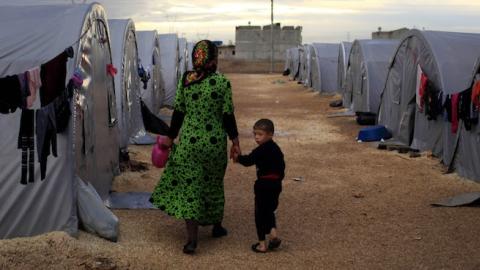This essay is adapted from a talk delivered on March 2nd at the “Providence, Military Women, and Syria” conference, an event jointly hosted by Providence and The Institute of World Politics.
More than 250,000 Syrians have lost their lives in four-and-a-half years of armed conflict, and 11 million—half of the Syrian population—have been forced from their homes as pro President Bashar al-Assad forces, rebels, and a variety of jihadists including the Islamic State vie for power.
The image of the precious little Syrian boy, his body washed ashore, is now deeply associated with the plight of Syria’s refugees. In fact, if you do a simple search of “Syrian refugees,” odds are you’ll see photos of beleaguered children.
Last year President Obama announced his plan to bring in 10,000 refugees to the United States and admonished those who oppose doing so. According to polls, over half of the American people oppose his plan, and more than half the nation's governors say they oppose letting Syrian refugees into their states.
President Obama wasn’t the only one who slammed opponents of his plan. Other politicians and religious leaders welcomed the refugees, and some waxed eloquently about our country’s immigrant heritage in an effort to win support for the influx of refugees.
After all, George Washington did write in 1785, “let the poor, the needy and oppressed of the Earth, and those who want Land, resort to the fertile plains of our western country, the Second Land of Promise, and there dwell in peace, fulfilling the first and great commandment.”
Emotions run high, and it makes it difficult to look at the matter with clear eyes. But let us try. A good place to begin is a quick study of what is going on in Syria and how it began.
Pro-democracy protests erupted in March 2011 after the government’s arrest and torture of teenagers who painted revolutionary slogans on a school wall. Security forces opened fire on demonstrators, killing several, and this inspired more to take to the streets. The unrest triggered nationwide protests demanding President Assad's resignation. The government's use of force to crush the dissent merely hardened the protesters' resolve and by the summer of 2011, hundreds of thousands had taken to the streets across the country.
Opposition supporters eventually began to take up arms, first to defend themselves and later to expel security forces from their local areas.
Pressure had been mounting in the United States for President Obama to devise a plan before the chaos turned into an utterly failed state. In 2012, President Obama was asked if anything might change his mind about not intervening in Syria. He said: "We have been very clear to the Assad regime, but also to other players on the ground, that a red line for us is we start seeing a whole bunch of chemical weapons moving around or being utilized," the president said. "That would change my calculus. That would change my equation."
Then, just one year later, there was indisputable evidence that the Assad government indiscriminately used chemical weapons (CWs) against civilians.
Barack Obama condemned the attacks and then sought Congress’s approval to authorize force to strike back at Assad. Congress, unconvinced that the President had any sort of plan for removing Assad or necessary plans for stability operations that would be required once a power vacuum was created, balked. The President could not receive Congressional support, and rightfully so.
Then, coming to his rescue was none other than Vladimir Putin, who proposed brokering a deal with the Syrian dictator that would remove the CWs and prevent a military strike by the United States. President Obama eagerly accepted the plan, and the Organization for the Prohibition of Chemical Weapons (OPCW) got busy removing Assad’s declared chemical weapons. After the OPCW determined all declared chemical weapons had been removed, Assad’s government once again used chemical weapons on Syria’s people.
In addition to providing Assad diplomatic backing, Russia’s Putin aggressively provided necessary military backing to Assad—not merely in the form of weapons, but in direct military force. In October 2015, Russian precision guided cruise missiles went through Iraqi and Iranian airspace and landed on targets in Syria.
Who would have thought when President George W. Bush toppled Saddam and propped up the nascent Iraqi government now freed from a dictator’s clasp, that the same country—of which so much American blood and treasure has been spent—would bet on Russia over the United States in a new international crisis? Russia’s military interference in Syria is proof positive that America’s influence in the Middle East and beyond has been severely diminished, and that U.S. global preeminence is not a status Americans should take for granted.
Although Russia claims to be fighting ISIS and al-Qaeda, U.S. officials say that about 70 percent of Russian air strikes have targeted more moderate Syrian rebel groups, including some supported by the United States. It is believed that more than 1,000 civilians have been killed by Russian indiscriminate airstrikes. And now, according to General Breedlove, commander of European Command, over 25,000 foreign fighters have traveled to Syria to enlist with Islamist terrorist groups, including at least 4,500 westerners.
So this is the environment in which we find ourselves. A country, war torn, in which it is almost impossible to identify a side worth supporting to a significant degree.
So, what about those immigrants looking for peace?
As you can imagine, it is quite difficult to really get a good handle on the loyalties of the refugees, but there was one, seemingly balanced survey that made headlines. It was by the Arab Opinion Index team, within the Doha-based Arab Center for Research and Policy Studies.
It found that “only about 13% of Syrian refugees had a positive or somewhat positive view of ISIS.” It doesn’t seem so bad, right?
Well, it also found that 10% had a ‘negative to some extent” opinion of ISIS—not exactly a denouncement. So 23% of refugees had either a positive, somewhat positive, or negative to some extent opinion of ISIS. So, if we allow 10,000 refugees in from Syria, some of them will certainly be children, but still—23% have at least some sympathies toward ISIS.
Hate to break it to the human rights groups, but ISIS is not the only power player. This is what the study did not ask—how many of those refugees have a positive opinion of Assad? What about Al Qaeda? You get my point.
But, do they at least like the United States? Do they yearn for the freedom and pluralism we offer that so many Americans are seemingly eager to extend?
Bill Frelick, the director of the refugee rights program for Human Rights Watch, said, “overwhelmingly we’re talking about people who are seeking protection and bear no ill will, and I would say in fact bear gratitude to anyone who’s willing to help them.”
This is not reality. It is a fiction that flies in the face of reality.
That same poll revealed that 66% of Syrian refugees believe ISIS is a product of foreign actors. And the overwhelming majority is opposed to United States involvement in the region.
And, given the conservative, anti-secular/Western nature of many devout Muslims, more than a few immigrant Muslim communities do not assimilate well, and instead form pockets, and, as in some cases, whole communities apart from their American neighbors.
Once considering the facts, it does seem there is substantial evidence that admitting refugees from Syria is simply taking on a risk that is too great, not merely in the short term, but in the long term as well.
But what about those lofty sentiments expressed by the Founders that many like to quote? Weren’t the Founders pro-immigrant? This is a subject that deserves its own treatment, and I commend Dr. Matthew Spalding’s 2006 manuscript entitled “Making Citizens: The Case for Patriotic Assimilation” for those who would like to think more deeply about the subject. But I think it’s important to at least address it in the context of this talk. So, “yes,” the Founders were pro-immigrant, but they did not throw prudence to the wind.
They understood that countries were not merely countries due to geographic borders, although that was part of it. But countries were held together by common heritages, traditions, political institutions, mores. And immigration here—and definitely citizenship was a weighty privilege—did not come without conditions. And so it was very important to the Founders that immigrants assimilated and abandoned previous loyalties.
For example, the Founders were especially concerned about non-English immigrants—like the Germans, French, and Dutch—because they did not share the same heritage or traditions with the English, or even with each other.
Notably, these immigrants settled together in large groups, preserving for some time their own cultures and habits and did not mix well with the rest of the population. Jefferson thought "they should distribute themselves sparsely among the natives for quicker amalgamation." Washington agreed and thought that by settling in groups, immigrants would "retain the language, habits and principles (good or bad) which they bring with them. Whereas by an intermixture with our people, they, or their descendants, get assimilated to our customs, measures and laws: in a word, soon become one people."
In conclusion, having a pro-immigrant posture is truly American. But immigration to the United States is a privilege, not a right, and there is ample evidence to suggest the risk for accepting more Syrian refugees is simply unwise.
If Americans, especially Christians, feel compelled to do more to ease the suffering of Syria’s refugees, I recommend reaching out to private organizations doing wonderful meaningful work. My two favorites are Samaritan’s Purse and the International Missions Board.














